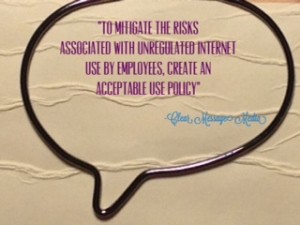By Jennifer Henderson
 When I was a recent college graduate, at my first job as an assistant editor, my boss caught me wasting time at work talking to my then-boyfriend (now husband) on the phone. She was really nice about it, but did express concern that personal phone calls cut into productivity. I got the message and stopped those calls because I knew she was right; talking on the phone during work hours did reduce my productivity. Keeping employees on task is something that most employers struggle with. Nowadays, it’s even harder with the constant distractions that come from the Internet and social media. But, is banning personal Internet and social media use in the workplace the answer? What are the pros and cons of personal Internet use at work?
When I was a recent college graduate, at my first job as an assistant editor, my boss caught me wasting time at work talking to my then-boyfriend (now husband) on the phone. She was really nice about it, but did express concern that personal phone calls cut into productivity. I got the message and stopped those calls because I knew she was right; talking on the phone during work hours did reduce my productivity. Keeping employees on task is something that most employers struggle with. Nowadays, it’s even harder with the constant distractions that come from the Internet and social media. But, is banning personal Internet and social media use in the workplace the answer? What are the pros and cons of personal Internet use at work?
Pros
Completely cutting off the Internet for personal use may not be the best approach. Being able to access the Internet and social media sites can be a nice benefit to workers. For instance, paying a bill online during a lunch break or sending a note to a friend on Facebook can provide flexibility in the workplace. This, in turn, can boost employee morale.
In addition, if your competitors are allowing their employees Internet and social media access, yet you do not, your employees may perceive your company as too restrictive. You could then lose valuable talent to your competitors. An article in Forbes magazine mentions how one third of Millenials, individuals born between the years of 1982 and 2004, “would rather have a flexible work environment and access to social media than a bigger paycheck.” The article goes on to state that, “The motivating factor here is flexibility in device usage. On average, these technology-obsessed workers use their devices 7.5 hours per day.”
Cons
But, this type of flexibility can bring a loss in employee productivity. Salary.com surveyed 3,200 people and 64% of those surveyed said they visit non-work related websites every day during work hours. Two-thirds of all respondents reported that they waste time at work on the computer each day.
In addition to lost employee productivity, allowing personal access to the Internet can expose companies to computer viruses and other risks such as identity theft. Distasteful posts on social media by employees may also tarnish an employer’s reputation.
Create a Policy
One way to mitigate the risks associated with unregulated Internet use by employees is to create an Acceptable Use Policy. This sort of policy outlines the rules for using an organization’s network resources. The Society for Human Resource Management (SHRM) provides a template that can serve as a good starting point.
Does your company allow employees to use social media for personal purposes? If so, do you monitor their usage? We’d love to hear your feedback in the comments below.

